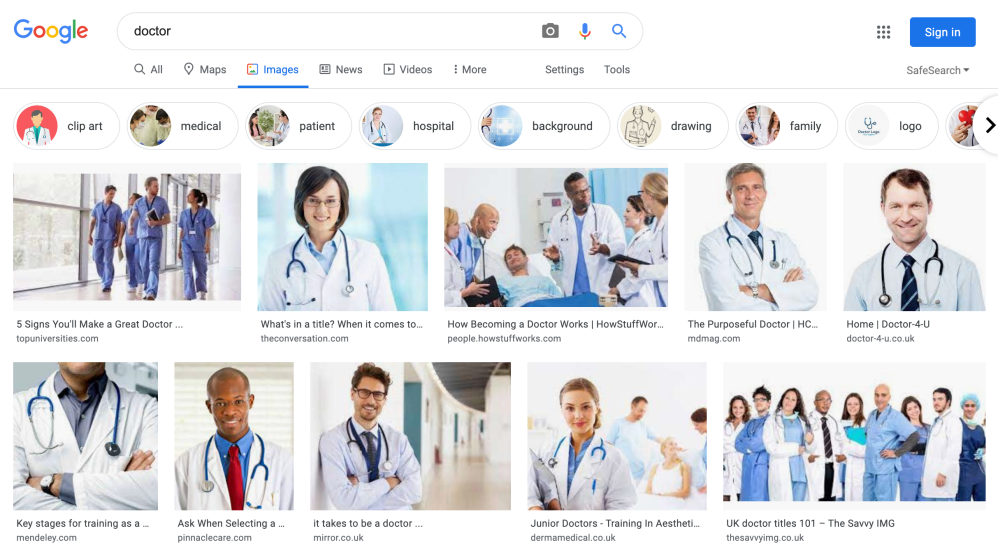Has your perception of your profession, your colleagues or yourself changed over the the last year? Time for an unreality check.
Learning objectives
1. Image search your job role/specialism
2. See what changes, if any, have occurred since last year
3. Reflect on whether these images are influencing patients and doctors
Last year I wrote a post called What does Dr. Google look like? I mentioned how images don’t always reflect reality and may influence expectations. This affects both patients and doctors. We also looked at the some of the data about the demographics of NHS doctors. Please look at the original post for additional information but some highlights are briefly summarised in the graphs below:

Graph adapted from GMC register data: https://data.gmc-uk.org/gmcdata/home/#/reports/The%20Register/Stats/report

Graph adapted from Department of Health and Social Care information: https://www.gov.uk/government/news/new-data-on-gender-pay-gap-in-medicine
 Contains public sector information licensed under the Open Government Licence v3.0.
Contains public sector information licensed under the Open Government Licence v3.0.
Image from https://www.ethnicity-facts-figures.service.gov.uk/workforce-and-business/workforce-diversity/nhs-workforce/latest#nhs-workforce-by-ethnicity-and-type-of-role
Since my original post, the world has experienced the Covid-19 pandemic which appears to have a disproportionate impact on BAME doctors. In addition, the Black Lives Matter movement has once again highlighted the inequalities that many individuals encounter, including within the medical profession. There also seems to be increased awareness of issues around gender inequality and ageism. The imagery that we are exposed has changed.
What I wanted to know was whether the events of the past year had influenced the google image ranking of the search term “doctor”. We know what Dr. Google looked like in 2019, but what about the class of 2020? Here goes:
2020 “doctor”
vs.
2019 “doctor”
Google and the Google logo are registered trademarks of Google LLC, used with permission.
Questions
What images do you get when you try the search for the term “doctor”?
If you have a specialism, what changes do you notice?
I will leave it to readers to reflect on how their image search results compare with the reality they have experienced. If you have time and feel comfortable to do so, please consider sharing your thoughts in the comments section at the bottom of this post.
I would also like to stress that I’m not anti-internet or anti-google etc. Such technology has enabled many of us to access previously hard to reach information and communicate with each other. It’s how you’re reading this very post. I’m also not going to pretend I understand the workings of the image ranking algorithm – I don’t understand it. I am instead interested to reflect on how a tool that many people around the world use as their primary means of seeking information can return an unreality. Importantly, I would like readers to consider if this unreality may in itself influence reality.
Questions
What is the end-point of this image alignment and reinforcement?
Google remains the most popular search engine, processing over 90% of all search queries worldwide. The graph below shows how other compare.

Graph from statcounter: https://gs.statcounter.com/search-engine-market-share
Following the previous post, a reader suggested that I also try some of the other search engines available. Below are the results I got when I searched for “doctor” in various other online search tools:




Questions
What influences your choice of search engine?
Does that search engine influence you?
The volume of information return following a query is immense and it’s not surprising that the casual user (myself included) in an effort to be expeditious will simply click on one of the first few items that appears. These returns may not always be the most relevant or most accurate. Yet, the information (including imagery) that we will be exposed to may nevertheless change our worldview.
I’ll aim to repeat this or a similar exercise again in the future. Who knows what the next year will hold in store and how that will influence the ranking of doctor images.
Summary
Many people use the internet to seek information. The amount of information can be overwhelming. Unsurprisingly there is fierce competition to be at the forefront of search engine results and algorithmic processes can create a false representation of reality. With time, this unreality in itself may influence reality: when patients seek and meet real doctors, when doctors work with other doctors, or in aspiring doctors who look at the image representation of our profession and question whether medicine is indeed a suitable choice for them. The previously fictional images may then become fact.
Further resources
The ethnicity of doctors in photos online
https://www.bmj.com/content/365/bmj.l4370
Racism and health
https://bjgp.org/content/70/697/381
One thought on “Google Images, M.D. (Class of 2020)”